Influencing Actions on the Ground in British Columbia: Today's Expectations are Tomorrow's Standards
Note to Reader:
To download a WORD version of this web story, click on Influencing Actions on the Ground in British Columbia: Today’s Expectations are Tomorrows Standard’s
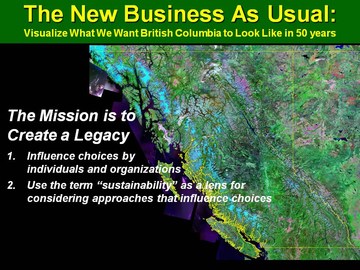
Creating a Legacy
The Province’s Living Water Smart and Green Communities initiatives provide a framework for convening for action in British Columbia. The ultimate goal is to establish expectations that will, in turn, influence the form and function of the built environment.
The desired outcome is to align efforts, build commitment and establish consistent expectations for effecting change on the ground: This is what we want to achieve, and this is how we will get there.
By taking the time to read the following selection of stories published on the Water Bucket website, the busy reader will gain insight into the partnership initiatives that are driving changes in accepted practices in British Columbia.
Living Water Smart, BC’s Water Plan
Living Water Smart is a visionary document that provides a framework for province-wide action. The Province is encouraging local governments to do business differently, prepare communities for change, and choose to be water smart.
By informing, educating and inspiring everyone, an over-arching goal is to change the way that land is developed and water is used. To learn more about local governments in particular are responding to the challenge, click on Living Water Smart in BC.

Green Communities Initiative
The mandate of the Ministry of Community Development is to foster partnerships, collaboration, innovation and integration through the program elements that comprise the Green Communities Initiative. The goal is to build capacity that will result in sustainable, healthy and vibrant communities.
The continuous process for improvement is illustrated by the graphic below. To learn more, click on Creating Our Future: Today’s Expectations are Tomorrow’s Standards for Living Water Smart.
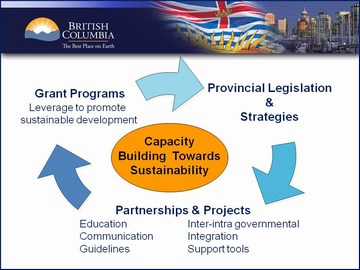
Prescriptive versus Educational Approach
A decade ago, the Province of British Columbia made a conscious decision to take an educational rather than prescriptive route to facilitating and leading change. It was recognized that one needs to inform, educate and inspire people to do better.
A decade ago, British Columbia and Washington State had the same science and a common understanding of what it meant. The two had the same point of departure, yet Washington State followed the prescriptive route, in part because of national regulations. To learn more about what a difference that approach has made, click on Rainwater Management on Diverging Paths in British Columbia and Washington State?

Accomplishing the Paradigm-Shift
Stormwater Management, Low Impact Development, Sustainable Drainage, Green Infrastructure, RAINwater Management, Design with Nature, Water Sensitive Urban Design, Innovative Stormwater Management, Sustainable Urban Drainage Systems…. what is an appropriate term to use?
Choice of language is a critical factor in moving from an “old” paradigm to a “new” paradigm. The Province of British Columbia is making a conscious effort to wean practitioners away from a single-objective stormwater management way of thinking and designing …..to a way of doing business that is holistic, namely RAINwater management. To learn more, click on From Stormwater Management to RAINwater Management.
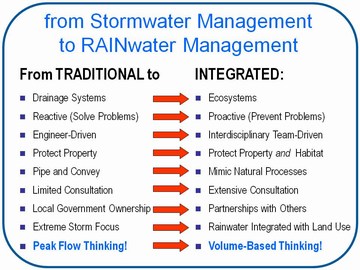
Today’s Expectations are Tomorrow’s Standards
Over the past decade, British Columbia has made considerable progress in changing infrastructure practices through an educational approach. Now, the focus is on how the Province’s grant programs provide incentives necessary to influence behaviour; and reward those who meet program objectives for doing business differently on-the-ground.
Integration of legislative goals and strategies with grant programs is achieved through the combination of Eligibility Requirements, Evaluation Criteria, and Conditionality of Contracts. To learn more, click on Today’s Expectations are Tomorrow’s Standards for Green Infrastructure in British Columbia
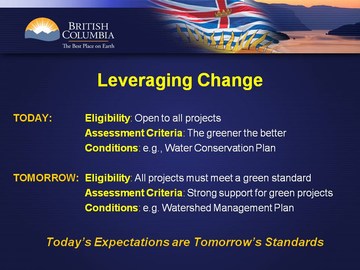
Aligning Local Actions with Provincial Goals
A key message relates to the desirability and importance of aligning local actions with provincial goals. Alignment leads to win-win outcomes for communities
Metro Vancouver is realigning the goals, strategies and actions in its’ updated Liquid Waste Management Plan (LWMP) to keep current with senior government policies and positions, as well as ensure that Metro Vancouver’s and senior governments’ environmental and fiscal objectives and actions are mutually supportive and successful. To learn more, click on Liquid Waste Management Plan provides framework for regional sewage treatment and municipal rainwater management.

Advancing a Regional Team Approach
The Province of British Columbia is promoting a regional team approach so that there will be consistent messaging regarding on-the-ground expectations for rainwater management and green infrastructure. The essence of a regional team approach is captured by this problem statement:
- How do we simultaneously work together as staff within a municipality and as a region AND externally with developers and other private sector players, to ensure we implement sustainable approaches to development?
In 2008, Vancouver Island was the pilot region for a regional team approach founded on broad and inclusive partnerships and collaboration. To learn more, click on The Story of the 2008 Vancouver Island Learning Lunch Seminar Series.
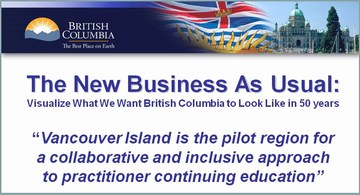
Posted April 2009

